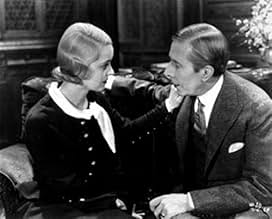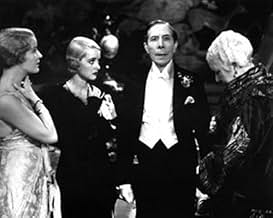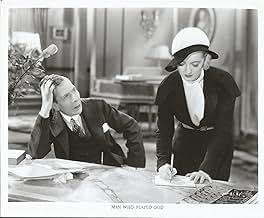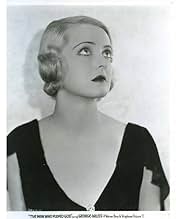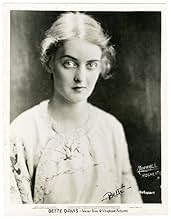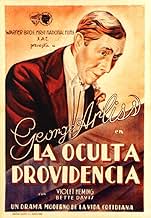NOTE IMDb
6,8/10
1,4 k
MA NOTE
Ajouter une intrigue dans votre langueAfter losing his hearing, a musician uses lip-reading to help others.After losing his hearing, a musician uses lip-reading to help others.After losing his hearing, a musician uses lip-reading to help others.
- Réalisation
- Scénario
- Casting principal
- Récompenses
- 1 victoire au total
George Arliss
- Montgomery Royle
- (as Mr. George Arliss)
André Luguet
- The King
- (as Andre Luguet)
Ivan F. Simpson
- Battle
- (as Ivan Simpson)
Charles E. Evans
- The Doctor
- (as Charles Evans)
Fred Howard
- Man
- (scènes coupées)
Symona Boniface
- Woman in Audience
- (non crédité)
Wade Boteler
- Detective
- (non crédité)
Elspeth Dudgeon
- Would-Be Ticket Buyer
- (non crédité)
Grace Durkin
- Kit - First Girl
- (non crédité)
Helena Phillips Evans
- Music Fan with Boy
- (non crédité)
Avis à la une
"Of Human Bondage," (1934) by RKO, to whom Bette Davis was 'loaned' by Warner Brothers, is most often given credit for the beginning of the Queen of the Silver Screen's magnificent acting career. That's not the historical fact, however; this movie, "The Man Who Played God," (1932) must be credited for bringing Bette Davis the recognition as an actor who could hold her own in the lead next to the great screen legend, George Arliss.
Davis was only 23 years of age when filming the show that earned her enough screen status for RKO to even desire her to play the leading, (dare I say) 'lady' next to leading man, Leslie Howard in "...Bondage." Arliss is to be credited for having, more or less, discovered Bette Davis; phoned her & the rest of her acclaimed acting career began.
So many of the critiquers repeat the myth that "... Bondage" is the film that made the world recognize how great an actor Davis was. But, if it was, RKO would have never even wanted her so badly that they 'got her on loan' from the Warners! RKO recognized the talent of Bette Davis in this film: "The Man Who Played God." So should we.
Never underestimate what young adult & teen women can achieve. After all, Mary Shelley wrote "Frankenstein," when she was only 19 years of age in a bet with great poets, Lord Byron & her husband Percy Bysche Shelley. Ann & Nancy Wilson of the rock band "Heart," composed many of their best songs when they were 13 years of age! Davis had already been on Broadway before taking her role in this movie. In fact, her acting career began when she was 15 (in 1923). Davis went on (& on!) to co-lead with Lillian Gish in "Whales of August," (1987), having been in over 100 movies; was the first woman to receive an Oscar at Warner Brothers (for "Dangerous"); the first person to be nominated for an Oscar 5 years in a row; the first woman to receive the AFI's Lifetime Achievement Award; the first person to be nominated for 10 Oscars; the highest paid woman during her prime. She was the epitome of a trail blazer who had to do it "the hard way."
Today, Robert Wagner, Miss Davis's son, Michael, & Miss Davis's closest assistant are key figures who keep Bette Davis's acting excellence alive, through the foundation named after her. Meryl Streep was the first actor to benefit from Davis's foundation. Obviously, the foundation board is taking Davis's acting acumen as a serious measure by which to select recipients of foundation awards & scholarships. Davis herself was the one to recognize Streep's acting abilities.
That's what kind of lady she was: she'd take a step back on the set to boost someone else's acting career; she'd take steps forward to seek out great scriptwriters, directors, cinematographers, etc. She strove to not only circulate her own gifts, but wanted to help others people do so with theirs--and still does so. Her reputation on the set was not as a "star," struck with ego maniacal lights in her fabulously expressive eyes. Instead, she was known to be a pleasure to work with amongst the team workers; and a real tough lady to contend with when she sensed something was amiss in a line, scene, lighting, direction, or co-worker. But, as Robert Wagner tells of Davis, she was truly a fun person to work with because she "always" came to work prepared to put on her very best performance. And when she goofed, she did so with a kind of cute humility that was full of wit enough to crack-up the co-workers she liked.
There's a huge difference between striving for perfection and believing we're perfect. Davis did the former. By the way, she gave her "Jezebel" Oscar to her son, Michael. Steven Spielberg bought her "Dangerous" one that was auctioned (for the second highest price ever) to benefit her foundation. This says to me that Davis herself knew she'd really earned her "Jezebel" Oscar; whereas it was no secret that the masses believed she got the "Dangerous" Oscar as a "consolation prize" for not even being nominated for, "Of Human Bondage."
By my standards, Davis was robbed of her third Oscar for playing the role of Charlotte Vale in "Now, Voyager." In Davis's mind, she was robbed of (what would have been her fourth) Oscar for playing Baby Jane Hudson in, "What Ever Happened to Baby Jane?"
Davis herself credited George Arliss & this movie for jump starting her into untouchable acting achievements. This movie is the movie to own if we want to say we've got a copy of Bette Davis's first great one.
Davis was only 23 years of age when filming the show that earned her enough screen status for RKO to even desire her to play the leading, (dare I say) 'lady' next to leading man, Leslie Howard in "...Bondage." Arliss is to be credited for having, more or less, discovered Bette Davis; phoned her & the rest of her acclaimed acting career began.
So many of the critiquers repeat the myth that "... Bondage" is the film that made the world recognize how great an actor Davis was. But, if it was, RKO would have never even wanted her so badly that they 'got her on loan' from the Warners! RKO recognized the talent of Bette Davis in this film: "The Man Who Played God." So should we.
Never underestimate what young adult & teen women can achieve. After all, Mary Shelley wrote "Frankenstein," when she was only 19 years of age in a bet with great poets, Lord Byron & her husband Percy Bysche Shelley. Ann & Nancy Wilson of the rock band "Heart," composed many of their best songs when they were 13 years of age! Davis had already been on Broadway before taking her role in this movie. In fact, her acting career began when she was 15 (in 1923). Davis went on (& on!) to co-lead with Lillian Gish in "Whales of August," (1987), having been in over 100 movies; was the first woman to receive an Oscar at Warner Brothers (for "Dangerous"); the first person to be nominated for an Oscar 5 years in a row; the first woman to receive the AFI's Lifetime Achievement Award; the first person to be nominated for 10 Oscars; the highest paid woman during her prime. She was the epitome of a trail blazer who had to do it "the hard way."
Today, Robert Wagner, Miss Davis's son, Michael, & Miss Davis's closest assistant are key figures who keep Bette Davis's acting excellence alive, through the foundation named after her. Meryl Streep was the first actor to benefit from Davis's foundation. Obviously, the foundation board is taking Davis's acting acumen as a serious measure by which to select recipients of foundation awards & scholarships. Davis herself was the one to recognize Streep's acting abilities.
That's what kind of lady she was: she'd take a step back on the set to boost someone else's acting career; she'd take steps forward to seek out great scriptwriters, directors, cinematographers, etc. She strove to not only circulate her own gifts, but wanted to help others people do so with theirs--and still does so. Her reputation on the set was not as a "star," struck with ego maniacal lights in her fabulously expressive eyes. Instead, she was known to be a pleasure to work with amongst the team workers; and a real tough lady to contend with when she sensed something was amiss in a line, scene, lighting, direction, or co-worker. But, as Robert Wagner tells of Davis, she was truly a fun person to work with because she "always" came to work prepared to put on her very best performance. And when she goofed, she did so with a kind of cute humility that was full of wit enough to crack-up the co-workers she liked.
There's a huge difference between striving for perfection and believing we're perfect. Davis did the former. By the way, she gave her "Jezebel" Oscar to her son, Michael. Steven Spielberg bought her "Dangerous" one that was auctioned (for the second highest price ever) to benefit her foundation. This says to me that Davis herself knew she'd really earned her "Jezebel" Oscar; whereas it was no secret that the masses believed she got the "Dangerous" Oscar as a "consolation prize" for not even being nominated for, "Of Human Bondage."
By my standards, Davis was robbed of her third Oscar for playing the role of Charlotte Vale in "Now, Voyager." In Davis's mind, she was robbed of (what would have been her fourth) Oscar for playing Baby Jane Hudson in, "What Ever Happened to Baby Jane?"
Davis herself credited George Arliss & this movie for jump starting her into untouchable acting achievements. This movie is the movie to own if we want to say we've got a copy of Bette Davis's first great one.
First and foremost, "The Man Who Played God" (1932) is not a Bette Davis vehicle. She was still a few years away from receiving top billing and graduating into 'A' pictures. However, the mere fact that she's in this overlooked and forgotten film will only push it into wider circulation and rapidly increase its number of viewers. So much has already been said about her, there's very little one can add to further compliment her. Personally, I think she gave some of her best performances in these early 1930s B programmers for Warner Bros. Sure, the material wasn't nearly as good, which only made her performances stand out all the more. But Bette Davis has little to do with what stands out about this movie.
After losing his hearing, a well-loved and respected piano player (George Arliss) becomes a recluse. He rejects most of his old friends and companions, and is cruel to the few he does see. He learns to read lips, but grows more and more depressed at the same time. And finally when he has hit rock bottom, he finds a purpose in his life,... philanthropy. Putting aside his own problems and selfishness, his salvation comes from helping others. This is a theme that would recur over and over again to varying degrees in the Depression era 30s (especially in Frank Capra's movies).
The other thing of interest here is the act of voyeurism. Through the aid of binoculars, he's able to read lips, and essentially, spy on everyday New Yorker's. One can't help but wonder if this little movie may have had some influence or have been the basis for the idea of Cornell Woolrich's short story "It Had to Be Murder", which would be eventually adapted into Alfred Hitchcock's "Rear Window" (1954).
This movie, is, by no means a masterpiece, but its still an important one. With so many interesting ideas going on here, its well worth the watch.
After losing his hearing, a well-loved and respected piano player (George Arliss) becomes a recluse. He rejects most of his old friends and companions, and is cruel to the few he does see. He learns to read lips, but grows more and more depressed at the same time. And finally when he has hit rock bottom, he finds a purpose in his life,... philanthropy. Putting aside his own problems and selfishness, his salvation comes from helping others. This is a theme that would recur over and over again to varying degrees in the Depression era 30s (especially in Frank Capra's movies).
The other thing of interest here is the act of voyeurism. Through the aid of binoculars, he's able to read lips, and essentially, spy on everyday New Yorker's. One can't help but wonder if this little movie may have had some influence or have been the basis for the idea of Cornell Woolrich's short story "It Had to Be Murder", which would be eventually adapted into Alfred Hitchcock's "Rear Window" (1954).
This movie, is, by no means a masterpiece, but its still an important one. With so many interesting ideas going on here, its well worth the watch.
Many of the reviews have focused on Arliss and Davis, and deservedly so. Hence there's no need to rehash that material. I want to highlight the excellent supporting cast.
Violet Heming (1895-1981) plays a suitor for Arliss. She was a British stage actress who worked with Arliss. She made few films (part of Thanhouser) and is best known for her stage work, which is unfortunate for the rest of us since her acting is really exceptional.
Louise Closser Hale (1872-1933) plays Arliss' sister and confidant. She combined a grandmotherly spirit with a quick wit and a sometimes tart edge in supporting roles ("Daddy Long Legs", "Shanghai Express", "Platinum Blonde") and her skill is probably nowhere better on exhibit than in this film.
Ivan Simpson (1875-1951) plays Arliss' manservant. He was a Scottish stage and film actor who worked with Arliss during the silent era. He made more than 100 films and later transitioned to TV. He was used extensively in the British dramas ("Prince and the Pauper", "Lloyds of London", "Captain Blood", "Mutiny on the Bounty"). This is probably the best example of his considerable talents, and the chemistry between he and Arliss is a joy to watch.
Look for Ray Milland (uncredited) in a brief scene in which he plays a man threatened with prison. For Milland (1907-86) this was his 15th film and fame was still a few years ahead. Ultimately he won an Oscar for "The Lost Weekend" (1946).
Also look for Hedda Hopper (1885-1966) as a west coast society matron. She is better known for her gossip columns, but she did, in fact, appear in over 100 films between 1916 and 1946.
This isn't a perfect film. It's a bit too long, Arliss does a few too many silent era long closeups, and the age difference between Arliss and Davis (24 vs. 65) is a bit too much. Otherwise it is a definite treat and holds up well after all these years.
Violet Heming (1895-1981) plays a suitor for Arliss. She was a British stage actress who worked with Arliss. She made few films (part of Thanhouser) and is best known for her stage work, which is unfortunate for the rest of us since her acting is really exceptional.
Louise Closser Hale (1872-1933) plays Arliss' sister and confidant. She combined a grandmotherly spirit with a quick wit and a sometimes tart edge in supporting roles ("Daddy Long Legs", "Shanghai Express", "Platinum Blonde") and her skill is probably nowhere better on exhibit than in this film.
Ivan Simpson (1875-1951) plays Arliss' manservant. He was a Scottish stage and film actor who worked with Arliss during the silent era. He made more than 100 films and later transitioned to TV. He was used extensively in the British dramas ("Prince and the Pauper", "Lloyds of London", "Captain Blood", "Mutiny on the Bounty"). This is probably the best example of his considerable talents, and the chemistry between he and Arliss is a joy to watch.
Look for Ray Milland (uncredited) in a brief scene in which he plays a man threatened with prison. For Milland (1907-86) this was his 15th film and fame was still a few years ahead. Ultimately he won an Oscar for "The Lost Weekend" (1946).
Also look for Hedda Hopper (1885-1966) as a west coast society matron. She is better known for her gossip columns, but she did, in fact, appear in over 100 films between 1916 and 1946.
This isn't a perfect film. It's a bit too long, Arliss does a few too many silent era long closeups, and the age difference between Arliss and Davis (24 vs. 65) is a bit too much. Otherwise it is a definite treat and holds up well after all these years.
In "The Man Who Played God" the venerable George Arliss plays a famous and sweet-natured concert pianist who must cope with catastrophic hearing loss. There are two male-female romantic love subplots, but the story is essentially about philosophical and moral issues. The movie is best remembered not for Arliss, who was the main attraction, but for a supporting role beautifully played by the future screen queen Bette Davis, who for the most part is also very well photographed by James Van Trees, enhancing her unique presence. Amusingly, Mordaunt Hall of The New York Times in his review of the film faulted her for speaking "too rapidly for the microphone." But Arliss himself, as an artist suddenly forced to reconstruct his whole approach to life, is sympathetic and compelling despite the lipstick he habitually wore, in the style of many male actors of that time. He is ably supported by a thoroughly winning cast including Violet Heming, Ivan Simpson, Louise Closser Hale in an uncharacteristically non-dour role as the pianist's loving, intelligent and supportive sister, and even a very young Ray Milland as half of a distressed young couple whose desperate utterances are deciphered from afar by Arliss with the aid of binoculars and freshly acquired lip-reading skills. The studio-created ambiance of bustling city streets, whether "Paris" or "New York," is less phony looking than the usual replications thanks to careful lighting and well-planned camera angles.
This story has been made and remade many times. The first was back in the 1910s as "The Silent Voice". Then, a decade later, George Arliss made "The Man Who Played God"...and then again, a decade after this, Arliss made a sound version. But that wasn't all...in the 1950s, Liberace made "Sincerely Yours"...yet another version of this story!
The story is about a world famous concert pianist (Arliss), a man who is beloved and loves life. He also has a significantly younger woman (Bette Davis) who wants to marry him. But in spite of this, his life takes a sour turn when he is deafened...and sour is the word for it! This is because the pianist soon becomes bitter and resentful from his hearing loss and he spends much of his time brooding. So what is his salvation? See the movie.
Arliss, as usual, is very good. And, the story is a wonderful tale about loss and coping with it. My only complaint, and it's a minor one, is that the story seems a tad old fashioned. Now this does NOT mean I suggest you see the later Liberace version...it's not particularly good. But the 1932 film is well worth seeing...with a great object lesson for us all.
By the way, late in the film look carefully at the minor character of an embezzler...it's played by the soon to be discovered Ray Milland.
The story is about a world famous concert pianist (Arliss), a man who is beloved and loves life. He also has a significantly younger woman (Bette Davis) who wants to marry him. But in spite of this, his life takes a sour turn when he is deafened...and sour is the word for it! This is because the pianist soon becomes bitter and resentful from his hearing loss and he spends much of his time brooding. So what is his salvation? See the movie.
Arliss, as usual, is very good. And, the story is a wonderful tale about loss and coping with it. My only complaint, and it's a minor one, is that the story seems a tad old fashioned. Now this does NOT mean I suggest you see the later Liberace version...it's not particularly good. But the 1932 film is well worth seeing...with a great object lesson for us all.
By the way, late in the film look carefully at the minor character of an embezzler...it's played by the soon to be discovered Ray Milland.
Le saviez-vous
- AnecdotesThis was the first movie Bette Davis made under her contract to Warner Bros., the studio under which she did most of her best-known work of the 1930s and '40s. Her earlier six films were made for various studios, (including Universal, RKO and Columbia) all of which let her go.
- GaffesWhen Royle goes to his desk after observing the couple in the park, the shadow of the boom microphone dips onto the window curtain behind him.
- Citations
Grace Blair: You're my ideal!
Montgomery Royle: I shall always be... your friend.
- ConnexionsFeatured in Hollywood: The Great Stars (1963)
- Bandes originalesFantaisie-Impromptu in C sharp minor, Op. 66
(1834) (uncredited)
Written by Frédéric Chopin
Played on piano by George Arliss (dubbed by Salvatore Santaella) at the concert
Meilleurs choix
Connectez-vous pour évaluer et suivre la liste de favoris afin de recevoir des recommandations personnalisées
Détails
- Date de sortie
- Pays d’origine
- Langues
- Aussi connu sous le nom de
- Covek koji se dopao Bogu
- Lieux de tournage
- Société de production
- Voir plus de crédits d'entreprise sur IMDbPro
Box-office
- Budget
- 237 000 $US (estimé)
- Durée1 heure 20 minutes
- Couleur
- Mixage
- Rapport de forme
- 1.37 : 1
Contribuer à cette page
Suggérer une modification ou ajouter du contenu manquant

Lacune principale
By what name was The Man Who Played God (1932) officially released in India in English?
Répondre
